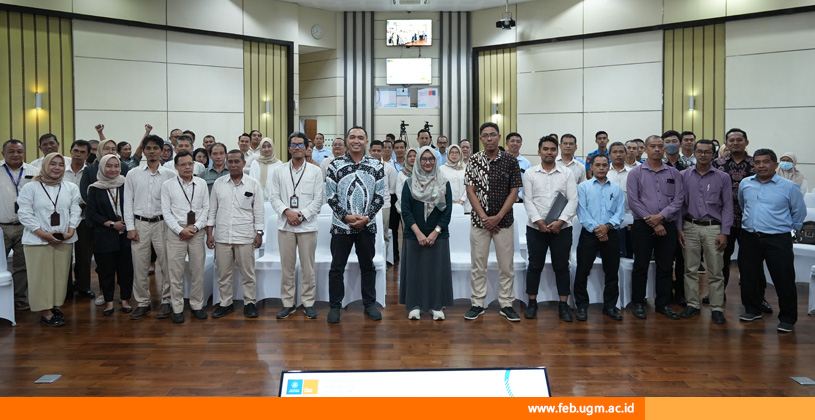Poor Diet Has a Negative Influence on Productivity
- Details
- Written by Hayfaza
- Category: News
- Hits: 482

In order to increase the productivity, welfare and health of human resources, on Tuesday (28/11), the Faculty of Economics and Business, Universitas Gadjah Mada (FEB UGM) held a self-development for professional staffs (Tendik) with the theme "Balanced Nutrition to Increase Productivity in the Workplace''. This self-development invites Dr. Mirza Hapsari Sakti Titis Penggalih, S.Gz, MPH, RD as Secretary of the Department of Health Nutrition, Faculty of Medicine, Public Health and Nursing (FKKMK) UGM and Lecturer at FKKMK UGM as resource person. This event aligns with SDGs Goal 3, Good Health and Well Being, and Goal 8, Decent Economic Growth.
Tendik self-development is carried out in a hybrid manner, with an offline room in the Function Hall of the Learning Center Building, Floor 8. This self-development is attended by all tendik, both permanent and non-permanent and contract civil servants. This event was also attended and welcomed by the Dean of FEB UGM, Prof. Dr. Didi Achjari, M.Com., Ak., CA.
Dr. Mirza started Tendik's self-development by explaining research on eating patterns in Indonesia and their effects on health. Then, Dr. Mirza explained the formula to meet needs and a food menu that contains balanced nutrition, especially for office workers. More specifically, Dr Mirza explained the important daily nutritional formula, namely that office workers' carbohydrate needs range from around 45-65% of total calorie intake, while protein needs cover 10-12%, fat intake covers 20-25%, and fluid needs cover 30-40 ml per kilogram of body weight. This FKKMK lecturer then visualized the ideal proportions of food on one plate. Dr. Mirza also explained messages for achieving balanced nutrition, starting from getting into the habit of checking food labels and doing physical activity to being grateful for food.
In this regard, Dr. Mirza explained to the staff that a poor diet had a negative effect on employee productivity. More specifically, she explained research that obese employees (BMI ≥ 30) had 1.43 more sick days, 3.08 more total absences, and a 281% difference in compensation days for workers compared to employees with a BMI < 27 kg / m2. Dr. Mirza added to his presentation with research results that there are economic burdens caused by physical inactivity. In the final part, Dr Mirza followed up on the things she explained with an explanation about weight management that students can do while carrying out their work at FEB UGM. After the presentation, Dr. Mirza opened the question session, which the FEB UGM staff attended enthusiastically.
Reportage: Hayfaza Nayottama




